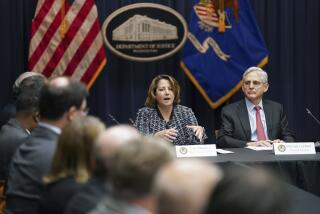U.S. Dealt Setback in Decision on Labs Owned by Doctors
- Share via
The U.S. government, in a case involving a Santa Ana-based clinical laboratory concern, suffered a major setback to its efforts to crack down on what it considers self-dealing by physicians.
Richard P. Kusserow, inspector general for the U.S. Department of Health and Human Services, charged that three clinical laboratories in California operated by the Hanlester Network were paying illegal kickbacks to doctors who invested in the facilities and steered patients to them.
However, an administrative law judge ruled that the arrangement was legal because the payments that the physicians received were based on the amount they had invested and not on the number of referrals they made. Judge Steven T. Kessel refused to ban the principals or the medical director of the now-defunct laboratory organization from future participation in federal Medicare and Medicaid programs. The inspector general’s office said it plans to appeal.
The Hanlester case was viewed as a test of the inspector general’s broad contention that the profits that doctors make from their investments in ancillary health-care services, such as medical imaging centers and outpatient surgery centers, are actually kickbacks in disguise. The Health and Human Services Department is investigating numerous physician joint ventures to determine if they inflate medical costs by encouraging doctors to overuse expensive medical technology.
Thomas S. Crane, an attorney for the inspector general, refused to comment on what impact the decision could have on pending cases. He said the government is confident of winning its appeal.
Brad Tully, a principal with Hooper, Lundy & Bookman, the Los Angeles law firm that represents the Hanlester labs, said the decision will help to uphold the legality of other physician joint ventures. He said the inspector general’s interpretation of the federal anti-kickback statute has “had a chilling effect on all kinds of relationships among health providers.”
Patric Hooper, the lead attorney for Hooper Lundy on the case, said the decision “gives the health-care industry some guidance on how the anti-kickback statute should be interpreted and applied.”
A federal law that goes into effect in January, 1992, will prohibit doctors from referring Medicare patients to clinical laboratories in which they have an ownership interest.
Bill Vaughan, an administrative aide to Rep. Pete Stark (D-Oakland), sponsor of the pending law, said the judge’s decision shows the need for broader restrictions on physician-owned medical enterprises. “We need a bright line, a clear rule that physicians should not invest in things and then refer people to them for profit,” he said.
According to Kessel’s 97-page decision, the three Hanlester laboratories--Pacific Physicians Clinical Laboratory in Santa Ana, Omni Physicians Clinical Laboratory in Pasadena and Placer Physicians Clinical Laboratory in Sacramento--offered doctors limited partnership shares at $500 a share, requiring each investor to purchase a minimum of three shares, and told them that they could expect an annual return of $200 to $532 per share.
The laboratory enterprise attracted about 150 physicians, who invested about $562,000, according to the inspector general’s office. The actual returns that they received on their investment ranged from 18% to 65% a year, which the judge said did not greatly exceed returns typically paid by health-care limited partnerships.
The physicians were told that their returns depended on their referrals, and if they didn’t use the labs, it would be a “blueprint for failure,” according to Kessel’s decision. SmithKline Beecham Clinical Laboratories Inc., a unit of SmithKline Beecham PLC, was hired to manage the labs. About 20% of the tests referred to the Hanlester laboratories were performed there; the rest were done by SmithKline.
SmithKline was originally charged in the case but agreed to pay a $1.5-million settlement in 1989 without admitting any wrongdoing. Subsequently, SmithKline canceled its management contracts with the laboratories, which then closed.
More to Read
Sign up for Essential California
The most important California stories and recommendations in your inbox every morning.
You may occasionally receive promotional content from the Los Angeles Times.













